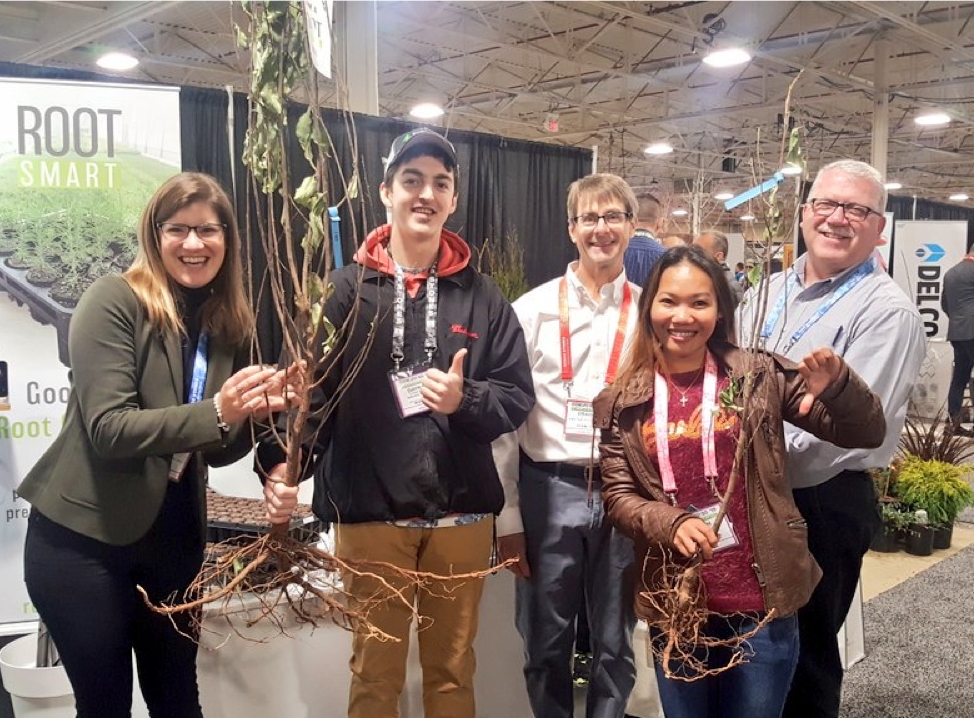
Features
Business
Labour
In conversation with the graduates
Digitally savvy, environmentally conscious and ready to enter the industry, two horticultural graduates share their thoughts on the future as they enter the job market.
July 23, 2019 By Elise Johnson

As summer sets in, the entire horticulture industry pivots. Greenhouses prepare for next year, garden centres are in full swing, and horticulture students across Canada take off their graduation caps and head into the workforce.
Digitally savvy and driven by a desire to improve the environment, this next cohort of horticulture talent is passionate about the future of our industry. Two graduating students from the Niagara College Horticulture diploma program, Daynan Lepore and Rain Avila, discuss school, graduation and what they hope to accomplish as they cross the finish line and enter the job market.
What inspired you to pursue horticultural studies?
Daynan: I was interested in environmental issues and photography, and I was looking for a career path that could blend those interests with the goal of driving change. I thought the study of plants would be a good direction. I was right! My passion for the environment and use of photography and social media have helped me make connections to growers and suppliers.
Rain: I came to Canada from the Philippines with a Bachelor’s Degree in Agricultural Engineering and was looking for a degree that would build on my education. To be honest, I had limited interest in plants before I started my program. But I became fascinated with the variety of native plants in Canada – there are so many kinds of pine! Now I’m a true plant geek.
Pine trees aside, what captivated you most during your studies?
Rain: Actually, it was deciduous trees and the concept of dormancy. Unlike the Philippines, Canada has four seasons and it makes a big difference in how plants behave. I remember my first time seeing a tree lose its leaves and thinking, “It’s dead!”. The fact that a tree can grow, rest and grow again opened my eyes to the mystery of plants.
Daynan: For me, it was propagation, and specifically how it’s tied to evolution. Each plant is unique in how it replicates itself. Some drop seeds, some send out runners, some can be genetically identical but will reproduce differently depending on the growing conditions. This kind of plant intelligence boggles my mind.
Your passion for plants is contagious! What else do you feel your generation has to offer the industry?
Rain: I think our generation is energetic and committed to environmental issues. And with technology and social media, it’s a lot easier to create change.
Daynan: I agree. We aren’t the first group to care about the environment and climate change, but our access to the internet gives us an unprecedented opportunity to really do something. We’re sharing knowledge and building online communities. Whether it’s the push to save pollinators or the ban on neonics, the internet has allowed us to create change at a rapid pace.
What would you say is the most important thing to enact change and help drive horticulture forward?
Daynan: A willingness to keep learning. No more “That’s what my dad or grandfather did.” We need to read, listen, keep learning and make our decisions based on that knowledge.
What’s next for you after graduation?
Rain: I hope to find a job that involves research and integrated pest management. Given a chance, I would also love to pursue further education, but I hope that a research-related employment opportunity comes my way.
Daynan: I’m still deciding. I want to continue using photography and social media to drive change, whether that’s through having my own native tree nursery or working with a horticulture magazine. The industry is broad and the possibilities seem endless. As long as I can go home and say I did something to help the environment, then that’s success to me.
What’s one change you’d like to see in the horticulture industry by the time you retire?
Rain: More disease-resistant cultivars.
Daynan: Increased use of biological control methods.
Very succinct answers! Last question: If you could give your first-year self a piece of advice, what would it be?
Rain: Do what you can today, don’t wait for tomorrow.
Daynan: Get involved with projects and meet as many people as you can. You never know who will be the one to help get your foot in the door. If it wasn’t for our participation in the oak tree research project with Professor Mary Jane Clark, Rain and I might not know A.M.A. Horticulture, and we might not be doing this interview today!
Elise Johnson is manager of communications & marketing at A.M.A. Horticulture Inc.
Print this page